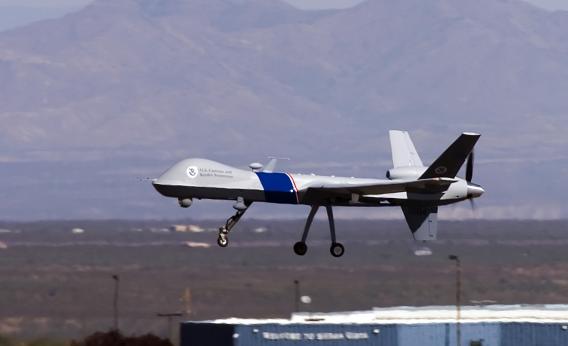Welcome to Drone U: When the Predator Comes Home

Photo by Gary Williams/Getty Images
We are excited to announce the launch of Drone U, a public education platform focused on the social, legal, and philosophical implications of drone technology. Drone U seeks to go beyond the headlines to provide a deeper understanding of how this technology is affecting and will continue to affect our lives.
Every other week on Future Tense, we will highlight a talk from a leading thinker from Drone U speaking on the topic of what our drone future may look like. Drone U is produced in cooperation with the New America Foundation. (Future Tense is a partnership of Slate, the New America Foundation, and Arizona State University.)
Our first talk is from P.W. Singer, director of the Center for 21st Century Security and Intelligence at the Brookings Institution. In this episode, he focuses on the issues that arise when the Predator comes home and the political and moral challenges posed by unmanned aerial systems.
As Singer discusses, the current debate around drones is comparable to the initial challenges posed by the introduction of the car in 1900. This technology brought strange new questions, such as how to protect people from them. The first fine for “speeding” came just a few years later, when a man was arrested for endangering the lives and property of pedestrians in downtown Jacksonville, Fla. He had exceeded the 6 mile per hour speed limit. “Horseless carriages” were a technology that once seemed alien much like unmanned aerial systems do today.
When we think about technologies like the Predator or Packbot, we need to remember that they are just the first generation—the Model T Fords and Wright Flyers. We are still at the “horseless” stage of this technology. Describing these technologies as “unmanned system” means we are focused on what they are not, rather than wrestling with what they truly are.
What the opening of the civilian airspace will do to robotics is akin to what the Internet did to desktop computing. Revolutionary technologies force us to ask new questions about what is possible and consider things that weren’t conceivable a generation before. But they also force us to relook at what is proper. They raise issues of right and wrong that we didn’t have to wrestle with before. With robotics, issues on the technical side may ultimately be much easier to resolve than dilemmas that emerge from our human use of them.
Join us on July 24 for the next episode from Drone U, in which Amie Stepanovich of the Electronic Privacy Information Center discusses the challenges posed by drone surveillance.
Future Tense is a partnership of Slate, New America, and Arizona State University.
